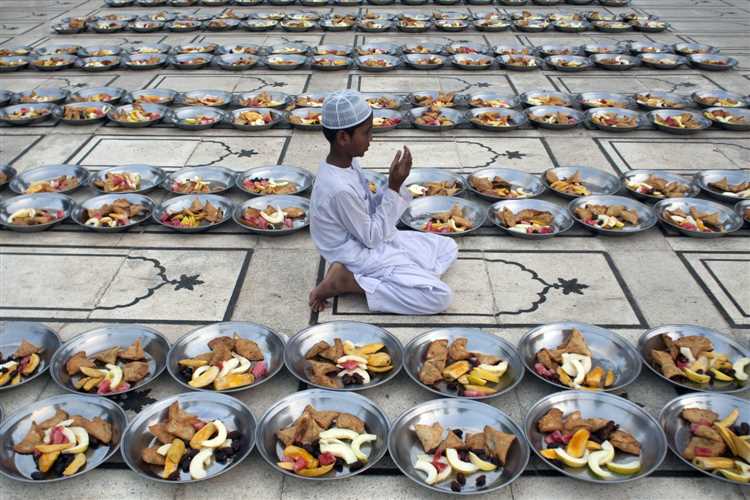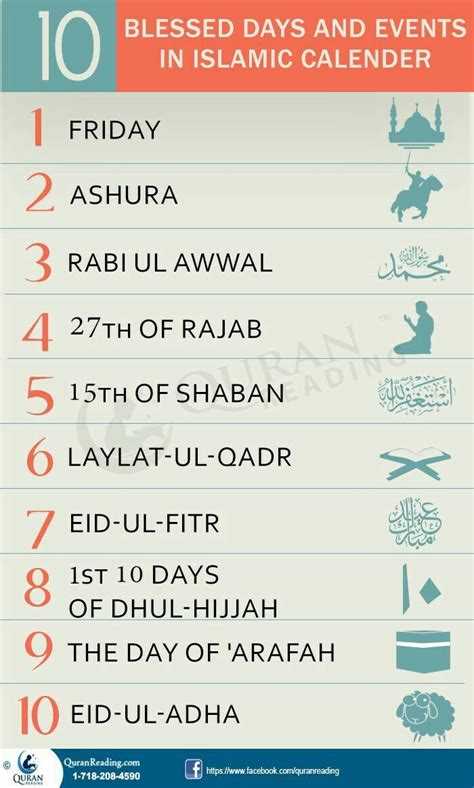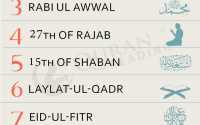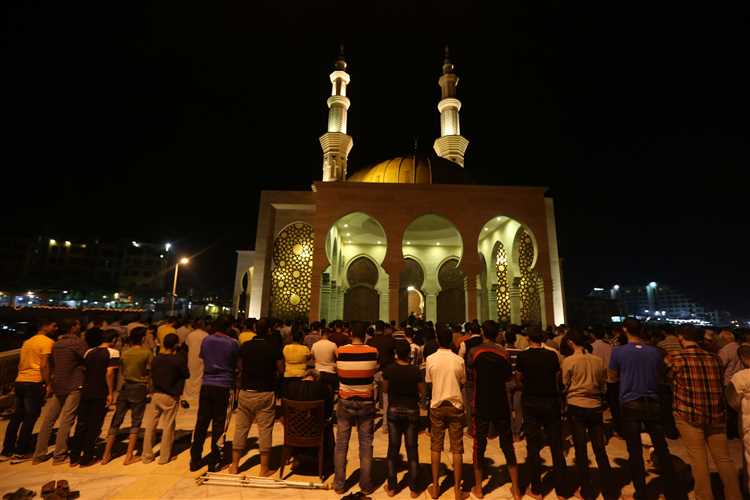Islam, one of the world’s major religions, follows a unique calendar system known as the Islamic calendar. Unlike the Gregorian calendar that is based on the sun, the Islamic calendar is based on the lunar cycle. This means that the start of a new day in the Islamic calendar is marked by the sighting of the moon.
The Islamic day begins at sunset, which is the time when the sun disappears below the horizon. This marks the end of one day and the start of the next day according to Islamic tradition. At sunset, Muslims perform the evening prayer known as Maghrib, which signifies the start of a new day.
It is important to note that the start time of the Islamic day can vary depending on the geographical location. This is because the sighting of the moon can differ from one place to another. In some regions, the moon may be visible earlier, while in others it may only be visible later.
“So whenever you see the evening, then fast until you see the night.” – Prophet Muhammad (pbuh)
Understanding the start time of the Islamic day is crucial for Muslims as it helps determine the timing of their daily prayers, fasting during Ramadan, and other religious observances. Muslims rely on local moon sighting committees or astronomical calculations to determine the start of the Islamic month and subsequently the start of each day.
The start of the Islamic day holds spiritual significance for Muslims as it represents a fresh start, the opportunity for redemption, and the chance to engage in acts of worship and devotion. It is a time for reflection, gratitude, and seeking blessings from Allah.
What is the Start Time of the Islamic Day?
The Islamic day begins with sunset. In Islam, each day starts at Maghrib, which is the evening prayer time when the sun sets below the horizon. At this point, the previous day ends and the new day begins. This is in accordance with the lunar calendar followed by Muslims, where each day is based on the sighting of the crescent moon.
The concept of the Islamic day starting at sunset is based on the Islamic lunar calendar, which is different from the Gregorian calendar used in many parts of the world. The Gregorian calendar is a solar calendar, where each day starts at midnight, while the Islamic calendar follows a lunar cycle, starting a new day from sunset to sunset.
Maghrib is one of the five daily prayers observed by Muslims, and it marks the end of the previous day and the beginning of the new day. It is customary for Muslims to perform their evening prayer at this time and break their fast during the month of Ramadan.
It is important to note that the exact timing of Maghrib, and hence the start of the Islamic day, varies depending on the geographical location. The time of sunset can differ from place to place due to differences in longitude and latitude. Therefore, Muslims living in different parts of the world may experience the start of the Islamic day at slightly different times.
In summary, the Islamic day starts at Maghrib, the time of sunset. This is in accordance with the Islamic lunar calendar, and it marks the end of the previous day and the beginning of the new day for Muslims. The exact timing of Maghrib can vary depending on the geographical location.
The Importance of Knowing the Start Time of the Islamic Day
The Islamic day begins at sunset, unlike the Gregorian calendar where a new day starts at midnight. The knowledge of the start time of the Islamic day is crucial for Muslims as it impacts their daily religious obligations and practices.
Observing Fasting: One of the Five Pillars of Islam is fasting during the holy month of Ramadan. Muslims fast from dawn (Fajr) until sunset (Maghrib). Therefore, knowing the exact time of sunset is essential to determine the starting and ending time of the fast.
Prayer Timing: Muslims are required to perform five daily prayers known as Salah. Each prayer has a specific time window within which it should be offered. The timing of the evening prayer, Isha, which is the final prayer of the day, is determined by the start of the Islamic day at sunset. Accurate knowledge of sunset time helps Muslims schedule their prayers accordingly.
Planning Religious Activities: Knowledge of the start time of the Islamic day is essential for planning any religious activities or events. Muslims gather for congregational prayers, Friday sermons, and other religious gatherings throughout the year. Having information about when the new Islamic day begins helps in organizing and managing these activities effectively.
Islamic Calendar: The Islamic calendar is lunar-based, and important religious occasions such as Eid-ul-Fitr and Eid-ul-Adha, which mark the end of Ramadan and the Hajj pilgrimage, respectively, are determined based on the sighting of the new moon. Knowing the start time of the Islamic day provides a reference for determining the date and duration of these significant observances.
Personal Spiritual Growth: Understanding the start time of the Islamic day encourages personal spiritual growth. It reminds Muslims that each new day is an opportunity for self-improvement, reflection, and drawing closer to Allah. It helps in setting intentions and priorities for the day and aligning one’s actions with the teachings of Islam.
Community Unity: A shared understanding of when the Islamic day begins fosters community unity. Muslims across the globe can connect and synchronize their activities based on the same reference point. It creates a sense of belonging and allows for coordinated efforts in religious, social, and charitable endeavors.
Conclusion: Knowing the start time of the Islamic day holds great significance in the lives of Muslims. It enables them to fulfill their religious duties, plan their activities effectively, and grow spiritually. It also promotes unity and a sense of community among Muslims worldwide.
The Concept of Day and Night in Islam
In Islam, the concept of day and night is closely related to the lunar calendar and the religious practices associated with it. According to Islamic tradition, a day begins at sunset and ends at the next sunset. The night, on the other hand, begins at sunset and ends at the next dawn.
One of the key aspects of Islamic belief is the recognition of the importance of time and the regular observance of prayers. Muslims are required to perform five daily prayers, known as Salah, at specific times throughout the day and night. The timing of these prayers is determined by the position of the sun and the moon.
During the day, Muslims perform the following prayers:
- Fajr: This prayer is performed before sunrise, when the first light appears on the horizon.
- Dhuhr: This prayer is performed after the sun has passed its zenith (its highest point in the sky).
- Asr: This prayer is performed in the afternoon, before sunset.
During the night, Muslims perform the following prayers:
- Maghrib: This prayer is performed immediately after sunset.
- Isha: This prayer is performed after the twilight has disappeared from the sky.
In addition to the five daily prayers, Muslims also have the option to perform voluntary prayers, known as Sunnah and Nafl prayers, at various times during the day and night.
The start and end times of the Islamic day and night play a crucial role in determining the timing of not only the daily prayers but also other religious practices, such as fasting during the month of Ramadan.
Overall, the concept of day and night in Islam is deeply intertwined with the lunar calendar and the religious obligations of Muslims. It serves as a reminder of the importance of time and the need for regular spiritual observance.
Significance of the Islamic Day Start Time
The start time of the Islamic day holds immense significance in Islamic traditions and practices. Understanding when the Islamic day begins helps Muslims to plan their daily activities, religious obligations, and spiritual practices according to the Islamic calendar.
According to Islamic beliefs, the day starts with the evening or maghrib prayer. This is the time when the sun has completely set below the horizon and darkness begins to prevail. It marks the end of the previous day and the beginning of the new day in the Islamic calendar.
This start time is of great importance as it determines the timing of various religious acts and rituals for Muslims. It helps in the determination of the prayer timings, the start and end of fasting during the holy month of Ramadan, and the observance of other significant Islamic events and holidays.
By knowing the exact start time of the Islamic day, Muslims can align their schedules and activities in accordance with the teachings of Islam. It allows them to fulfill their religious obligations and maintain a strong connection with Allah throughout the day.
Furthermore, understanding the start time of the Islamic day enables Muslims to engage in acts of worship and self-reflection during the early hours of the day. Early morning prayers, known as Fajr prayers, hold special significance as they symbolize the devotion and commitment of a Muslim towards Allah.
In addition to religious aspects, the start time of the Islamic day also influences socio-cultural practices for Muslims. It determines the timing of community gatherings, social events, and family activities. Being aware of the start time helps Muslims in planning their day effectively and ensuring participation in important communal activities.
Overall, the start time of the Islamic day carries immense significance in the lives of Muslims. It serves as a guide for religious rituals, acts of worship, and social engagements. By being aware of this time, Muslims are able to synchronize their daily lives with the spiritual teachings of Islam and strengthen their faith in the process.
How is the Start Time of the Islamic Day Determined?
The start time of the Islamic day is determined based on the position of the sun in the sky. Islamic days begin at sunset, which is the time when the sun has completely disappeared below the horizon.
In Islamic tradition, a new day is considered to start at Maghrib, the fourth daily prayer, which is performed immediately after sunset. This is because the Islamic calendar follows a lunar system, where each month begins with the sighting of the new crescent moon. As the sunset marks the end of the previous day, it also signifies the beginning of the new day in the Islamic calendar.
The determination of the start time of the Islamic day also varies depending on the geographic location. Since the position of the sun differs in different parts of the world, the time of sunset will vary as well. As a result, the start time of the Islamic day can differ between different regions and countries.
It is important for Muslims to be aware of the specific start time of the Islamic day in their respective locations in order to observe their religious obligations and perform the daily prayers at the correct times.
The Role of the Lunar Calendar
The Islamic calendar is a lunar calendar, meaning it is based on the cycles of the moon. Unlike the Gregorian calendar which follows the solar year, the Islamic calendar depends on the sighting of the moon to determine the start of each new month. As a result, the Islamic day starts at sunset, when the previous day officially ends and the new day begins.
The lunar calendar consists of 12 months, with each month being alternately 29 or 30 days long. This means that the Islamic year is approximately 354 days long, which is about 10 days shorter than the Gregorian year. This discrepancy causes the Islamic months to shift earlier in each Gregorian year, resulting in Ramadan, the ninth month of the calendar, occurring at different times each year.
The use of a lunar calendar holds significant importance in Islamic traditions and religious observances. For example, the start and end of the fasting period during Ramadan is determined by the sighting of the crescent moon. Similarly, the dates for the Hajj pilgrimage are calculated based on the lunar calendar.
The lunar calendar also has cultural and social significance in the Islamic world. Many religious festivals and celebrations, such as Eid al-Fitr and Eid al-Adha, are based on the lunar calendar and are observed according to the lunar dates. This adds a unique and distinct flavor to the Islamic cultural heritage.
In conclusion, the lunar calendar plays a vital role in determining the start and end times of the Islamic day. Its use in religious, cultural, and social contexts highlights its significance and ties it closely to the practices and traditions of the Islamic faith. Understanding the lunar calendar is essential for adherents of Islam to observe their religious duties and participate in the various celebrations throughout the year.
Calculation Methods for Determining the Start Time
There are several calculation methods used to determine the start time of the Islamic day. These methods have been developed over the centuries and take into account various factors such as the position of the sun, the latitude and longitude of the location, and the length of the day and night.
1. Umm Al-Qura: This is the official method used in Saudi Arabia, where the Islamic day starts at sunset. This method is based on the visual sighting of the crescent moon.
2. Muslim World League: This method calculates the start of the Islamic day based on the position of the sun below the horizon. The day starts when the sun is 18 degrees below the horizon.
3. Egyptian General Authority of Survey: This method is used in Egypt and starts the Islamic day at sunset. It also takes into account the position of the sun below the horizon, with the day starting when the sun is 19.5 degrees below the horizon.
4. University of Islamic Sciences, Karachi: This method is widely used in Pakistan and takes into account the position of the sun below the horizon. The day starts when the sun is 18 degrees below the horizon.
5. Gulf Region: This method is commonly used in the countries of the Gulf region. The day starts when the sun is 19 degrees below the horizon.
6. Moonsighting Committee Worldwide: This method relies on the actual sighting of the moon to determine the start of the Islamic day. It is based on the principle that the new Islamic month begins with the sighting of the crescent moon.
7. North America (Fajr-i-Khilafah): This method is used in North America and calculates the start of the Islamic day based on the position of the sun below the horizon. The day starts when the sun is 15 degrees below the horizon.
These are just some of the calculation methods used to determine the start time of the Islamic day. Different regions may use different methods, depending on their geographical location and cultural traditions. It is important for individuals to follow the local guidelines and rulings regarding the start of the Islamic day in their respective communities.
Differences in Start Time Calculation across Different Muslim Communities
Despite the fact that Islamic days follow the lunar calendar, the start time of the Islamic day can vary across different Muslim communities around the world. This is mainly due to the differences in interpreting and calculating important Islamic events, such as sunset and midnight. Here are some key differences:
-
Calculation Methodology: Different Muslim communities may follow different calculation methodologies to determine the start of the Islamic day. While some communities rely on astronomical calculations and modern technology, others may rely on local observations or traditional methods passed down through generations.
-
Local Customs and Culture: The start time of the Islamic day can also be influenced by local customs and cultural practices. In certain regions, Muslims may prioritize community prayer times or specific religious rituals, which can impact the determination of the start of the Islamic day.
-
Geographical Differences: The geographical location of a Muslim community can also play a role in determining the start time of the Islamic day. For example, communities in regions with extreme latitudes or long daylight hours during certain seasons may adjust their calculation methods to suit their unique circumstances.
Because of these differences, it is important for Muslims to rely on local Islamic authorities or consult community leaders to determine the start time of the Islamic day in their specific region. This ensures that they adhere to the correct Islamic practices and fulfill their religious obligations accordingly.
Why Does the Start Time of the Islamic Day Vary?
The start time of the Islamic day can vary due to a few factors:
- The timing of Fajr prayer: The Islamic day begins at dawn, which is determined by the timing of Fajr prayer. Fajr prayer is performed before sunrise, and its timing varies depending on the location and time of the year. As the timing of sunrise changes throughout the year, so does the start time of the Islamic day.
- Geographical location: The start time of the Islamic day can also vary depending on the geographical location. This is because the earth is divided into different time zones, and each time zone may have a different time for sunrise. Thus, people living in different regions will experience the start of the Islamic day at different times.
- Seasonal variations: Additionally, the start time of the Islamic day is also affected by seasonal variations. The length of the day and night changes throughout the year, with longer days in the summer and shorter days in the winter. This means that the start time of the Islamic day will be different in each season.
It is important for Muslims to be aware of the varying start time of the Islamic day as it determines the timing for prayers, fasting, and other religious obligations. Muslims rely on accurate calendars, prayer timings, and local mosque announcements to ensure they begin their day and fulfill their religious duties at the appropriate time.
Geographic Factors Affecting the Start Time
The start time of the Islamic day can be influenced by various geographic factors. These factors include the latitude and longitude of a particular location, as well as its proximity to the equator.
1. Latitude: The latitude of a location plays a significant role in determining the start time of the Islamic day. The Islamic day begins at sunset, which can vary depending on the latitude. In areas closer to the poles, such as Scandinavia, the days are much longer during summer, and shorter during winter. This can affect the duration of the Islamic day, as it may vary significantly throughout the year.
2. Longitude: The longitude of a location also plays a role in determining the start time of the Islamic day, although to a lesser extent than latitude. The time of sunset can vary slightly based on the horizontal position of a location on the Earth. This can lead to small variations in the start time of the Islamic day between places situated at different longitudes.
3. Proximity to the Equator: Locations near the equator experience relatively consistent day lengths throughout the year, which means that the start time of the Islamic day is not significantly affected by seasonal variations. In these areas, where the day and night lengths are more balanced, the start time of the Islamic day can remain relatively constant.
It is important to consider these geographic factors when determining the start time of the Islamic day in different regions. Understanding the impact of latitude, longitude, and proximity to the equator helps individuals and communities accurately and effectively observe the religious obligations associated with the Islamic calendar.
Seasonal Variations in the Start Time
The start time of the Islamic day is not fixed throughout the year. It varies due to the changing length of daylight and night time depending on the season and geographical location. The Islamic day begins at sunset, which is when the sun has fully set below the horizon, and the sky is completely dark.
Due to the different lengths of day and night throughout the year, the start time of the Islamic day can vary significantly. In locations closer to the equator, where there is relatively little variation in daylight and night time duration, the start time of the Islamic day remains fairly consistent. However, in locations away from the equator, such as those in the northern or southern hemisphere, the start time can vary by several hours between summer and winter.
During the summer months, when daylight is longer, the start time of the Islamic day is later. This means that the evening prayer, known as Maghrib, which marks the beginning of the Islamic day, will be later in the evening. On the other hand, during the winter months, when daylight is shorter, the start time of the Islamic day is earlier. As a result, Maghrib will be earlier in the evening.
The variations in the start time of the Islamic day due to seasonal changes in daylight can sometimes pose a challenge for Muslims living in extreme latitudes or regions with significant seasonal variations. In these cases, scholars and religious authorities often provide guidelines for determining prayer times and the start of the Islamic day based on the closest, more moderate latitude or on the convention adopted by the local Muslim community.
| Season | Location | Start Time of the Islamic Day |
|---|---|---|
| Summer | Ecuador | 7:30 PM |
| Winter | Ecuador | 5:30 PM |
| Summer | Sweden | 10:00 PM |
| Winter | Sweden | 3:00 PM |
It is important for Muslims to be aware of the seasonal variations in the start time of the Islamic day in their location and to consult local Islamic authorities or reliable Islamic calendars for accurate prayer times. This ensures that they can observe their religious obligations at the appropriate times.
Historical Perspective on Start Time Variations
The start time of the Islamic day, known as Fajr, has varied throughout history due to factors such as geographical location, technological limitations, and cultural practices. The concept of measuring time and determining the beginning of the day has always been important in Islamic tradition.
In the early days of Islam, before the advent of modern technology, determining the precise start time of the Islamic day was a challenge. People relied on their observation of the sky and the position of celestial bodies to estimate the beginning of Fajr. This method varied depending on geographical location and could differ among different communities.
With the advancement of technology, particularly the invention of accurate timekeeping devices and the establishment of standardized time zones, it became possible to determine the start time of the Islamic day more precisely. Islamic organizations and scholars started using astronomical calculations to determine the time of Fajr and other prayers, taking into account factors such as latitude, longitude, and altitude.
However, there is still some variation in the start time of the Islamic day among different communities and schools of thought. Some communities follow the calculated time based on astronomical data, while others rely on their local observation, considering factors such as the visibility of the crescent moon or the brightness of the sky.
The historical perspective on start time variations highlights the flexibility and adaptability of Islamic practices to different cultural and geographical contexts. It also indicates the importance of unity within the Muslim community, as differences in start times can lead to confusion and conflicting practices.
Overall, the determination of the start time of the Islamic day has evolved over time, from reliance on observation and estimation to the use of scientific calculations. While there may still be variations in practice, the aim remains the same – to fulfill the religious obligation of starting the day with the prayer of Fajr and to align one’s daily activities with the teachings of Islam.
Fajr: The Start of the Islamic Day
Fajr is the Arabic word for dawn, and it is the time when the Islamic day begins. It is considered as the first prayer of the day and marks the beginning of the fasting period for Muslims during the month of Ramadan.
Fajr begins at a specific time, which varies depending on the location and time of year. The timing of Fajr is determined by the rising of the sun. According to Islamic tradition, Fajr starts when the first light of dawn appears on the horizon and ends just before sunrise.
It is recommended for Muslims to perform the Fajr prayer in congregation at the mosque, although it can also be performed individually at home. The Fajr prayer consists of two units (rak’ahs) and is recited quietly.
Performing the Fajr prayer is not only an obligation for Muslims but also carries great spiritual significance. It is believed to be a time when the gates of heaven are open, and one’s prayers are more likely to be accepted.
Before the time of Fajr, Muslims are encouraged to engage in acts of worship such as reciting the Quran, making supplications, or engaging in remembrance of Allah.
It is important for Muslims to be aware of the exact timing of Fajr in their location to ensure they fulfill this essential duty. There are various Islamic apps and websites available that provide accurate Fajr times based on geographical location.
In conclusion, Fajr is the start of the Islamic day and marks the beginning of the fasting period during Ramadan. It is a time of spiritual importance and should be observed with devotion and sincerity by Muslims.
Understanding the Fajr Prayer
The Fajr prayer is the first prayer of the day in the Islamic faith. It is performed before sunrise, during the beginning of dawn. Fajr prayer is one of the mandatory prayers (salah) that Muslims are required to perform five times a day.
The time for the Fajr prayer begins at dawn, which is when the first light of the day starts to appear in the eastern horizon. It lasts until just before sunrise, when the sun starts to rise above the horizon. The exact time for the Fajr prayer may vary depending on the geographical location and the time of year.
In order to determine the correct time for the Fajr prayer, Muslims rely on various methods. One common method is to use a prayer timetable or Islamic calendar that provides the accurate prayer times for a specific location. These timetables are usually based on astronomical calculations and take into account factors such as the position of the sun, the tilt of the earth, and the geographical coordinates of the location.
It is important for Muslims to perform the Fajr prayer within its designated time. It is considered a virtuous act to pray the Fajr prayer in congregation at the mosque, although individual prayers at home are also acceptable. The Fajr prayer is a time for Muslims to seek the blessings of Allah, seek guidance for the day ahead, and show their devotion and submission to God.
During the Fajr prayer, Muslims perform a specific set of movements and recitations. This includes standing, bowing, prostrating, and sitting in a sequence known as rak’ahs. The Fajr prayer consists of two rak’ahs, and specific verses from the Quran are recited during each part of the prayer. It is recommended to recite chapters such as Al-Fatiha and other short verses during the Fajr prayer.
Muslims consider the Fajr prayer to be a time of spiritual purification and reflection. It is believed to be a time when the gates of heaven are opened, and one’s prayers and supplications are more likely to be accepted. The Fajr prayer is seen as a way to start the day on a positive and spiritually uplifting note.
The Spiritual Significance of Fajr
One of the most important prayers in Islam is the Fajr prayer, which is performed at dawn before sunrise. Fajr is considered the first prayer of the day and holds great spiritual significance for Muslims.
Fajr prayer marks the transition from the darkness of the night to the light of the day. It is a time when the world is still and quiet, offering a peaceful and serene atmosphere for reflection and devotion. Muslims believe that performing the Fajr prayer sets the tone for the rest of the day and establishes a strong connection with Allah.
The word “Fajr” itself means dawn or daybreak, symbolizing the beginning of a new day. It is a time when believers wake up from their sleep and turn to Allah in worship. By starting the day with Fajr prayer, Muslims seek Allah’s guidance and blessings for the day ahead.
Performing Fajr prayer requires discipline and commitment, as it is performed before sunrise when most people are still asleep. It is a test of one’s faith and dedication to wake up early and prioritize spiritual obligations over worldly pursuits. It is believed that those who consistently pray Fajr will be rewarded with blessings and protection throughout the day.
The Fajr prayer consists of two rak’ahs (units of prayer) and includes recitation of verses from the Quran. It is an individual prayer that is performed in solitude, allowing Muslims to focus on their relationship with Allah without distractions.
In addition to the spiritual significance, Fajr prayer also has physical and mental benefits. Waking up early and engaging in prayer helps to cleanse the mind and body, providing a fresh start to the day. It promotes discipline, mindfulness, and a sense of purpose.
Overall, Fajr prayer holds immense importance in the lives of Muslims. It serves as a reminder of Allah’s presence, a time for reflection and renewal, and a means to seek spiritual nourishment and blessings. By performing Fajr prayer, Muslims strive to connect with Allah, seek His guidance, and start the day on a positive and righteous note.
Sunrise: Another Indicator of the Islamic Day Start Time
In addition to the sighting of the crescent moon, another important indicator of the start time of the Islamic day is the sunrise.
In Islamic tradition, the start of a new day is marked by the breaking of dawn, also known as Fajr. Fajr prayer is performed before sunrise, and it is considered an important part of the daily routine for practicing Muslims.
While the time of Fajr varies depending on the geographical location and time of year, it is generally recommended to pray Fajr before sunrise when the first light of dawn appears on the horizon. This is often referred to as “false dawn” or “astronomical twilight.”
To accurately determine the start time of Fajr, Muslims consult astronomical tables and Islamic prayer timetables that account for the specific location and time of year. These tables provide precise information on the time at which astronomical twilight begins, allowing Muslims to plan their prayers accordingly.
It is important to note that the start time of Fajr may vary slightly depending on different interpretations within the Islamic community. Some scholars define the start of Fajr as the time when the center of the sun is 18 degrees below the horizon, while others may use different angles of elevation.
Overall, the sunrise is a significant indicator of the Islamic day start time, particularly in relation to the Fajr prayer. Muslims strive to perform Fajr prayer before sunrise to start their day on a spiritually focused note.
The Pleasure of Witnessing the Sunrise
Witnessing the sunrise is a remarkable experience that brings a sense of peace, tranquility, and gratitude. It allows us to appreciate the beauty of creation and the power of nature. The colors that paint the sky during sunrise are truly awe-inspiring, with shades of golden orange, pink, and purple merging together to create a breathtaking sight.
In Islamic teachings, witnessing the sunrise holds great significance. Prophet Muhammad (peace be upon him) encouraged Muslims to observe the beauty of the sunrise and to reflect upon the blessings of Allah. It is a time when the world wakes up to a new day, and with it comes the opportunity for renewal, growth, and gratitude.
Watching the sunrise can also be a spiritual experience, as it allows us to connect with our Creator and express our gratitude for the blessings He has bestowed upon us. It is a reminder of the infinite beauty and perfection of Allah’s creation.
Moreover, witnessing the sunrise can have a positive impact on our mental and emotional well-being. The soft light of the morning sun has a calming effect and can help to set a peaceful and positive tone for the day ahead. It can also serve as a reminder to start the day with a clear mind and a positive attitude.
To fully experience the pleasure of witnessing the sunrise, it is recommended to find a serene and peaceful location, away from the distractions of everyday life. Taking a few moments to sit in silence and contemplate the beauty of the rising sun can be a refreshing and rejuvenating experience.
In conclusion, witnessing the sunrise is a beautiful and fulfilling experience that carries deep spiritual, emotional, and mental benefits. It allows us to connect with nature, reflect on the blessings of Allah, and set a positive tone for the day. So, seize the opportunity to witness the sunrise whenever possible and embrace the joy it brings.
Cultural Practices Associated with Sunrise
In many cultures, sunrise holds significant cultural and religious importance. It is often seen as a time of new beginnings, inspiration, and renewal. Here are some cultural practices associated with sunrise:
- Meditation and Yoga: Many people practice meditation or yoga early in the morning, especially at sunrise. The serene and calm atmosphere at this time is believed to enhance the spiritual experience.
- Religious Rituals: In various religious traditions, sunrise is a sacred time. For example, in Hinduism, the morning prayers, known as “Sandhya Vandana,” are performed facing the rising sun. In this ritual, devotees express gratitude and seek blessings for the day ahead.
- Greeting the Sun: In some cultures, it is customary to greet the sun as it rises. This may involve reciting prayers or simply acknowledging the beauty and power of the sun.
- Outdoor Activities: Many people enjoy outdoor activities at sunrise, such as jogging, walking, or exercising. This time of day offers cooler temperatures and a sense of tranquility.
- Photography and Art: Sunrise is a popular subject for photographers and artists. The soft, warm light and vibrant colors that accompany the rising sun create stunning visuals that are often captured in photographs or depicted in paintings.
These cultural practices serve as a reminder of the beauty and significance of sunrise, connecting individuals to nature, spirituality, and their cultural heritage.
Times for Morning Prayers: Fajr and Sunrise
Two important prayer times in Islam are Fajr (also known as the pre-dawn prayer) and Sunrise. Fajr is the first prayer of the day and is performed before the sunrise. Sunrise marks the beginning of the Islamic day.
Fajr:
- Fajr time starts when the first light appears in the sky and ends when the sun begins to rise.
- The exact timing of Fajr prayer varies depending on the geographical location and the season.
- It is recommended to wake up before Fajr prayer to perform the pre-dawn worship known as Tahajjud.
- Fajr prayer holds significant importance in Islam as it is the time when the gates of Heaven are opened and the angels descend to hear the prayers of the believers.
Sunrise:
- Sunrise is the time when the upper edge of the sun appears on the horizon.
- It serves as the starting point for the Islamic day, which extends until the next sunrise.
- Sunrise marks the end of the Fajr prayer and the beginning of the morning.
It is important to note that the exact timings for Fajr and Sunrise prayer can be calculated using various methods, including astronomical calculations, to ensure accuracy. Muslims religiously follow these timings to perform their daily prayers on time and start their day in accordance with Islamic teachings.
The Ideal Time for Fajr Prayer
Fajr prayer is an obligatory prayer for Muslims that is performed before dawn. It is the first prayer of the day and holds great importance in the Islamic faith. The ideal time for Fajr prayer is based on the appearance of true dawn, known as Fajr al-Sadiq.
Fajr al-Sadiq refers to the time when there is a horizontal whiteness on the eastern horizon. This occurs before the actual sunrise and signifies the beginning of the Islamic day. It is believed that the angels change shifts at this time, making it a spiritually significant moment for Muslims.
Muslims are encouraged to perform Fajr prayer as early as possible after the onset of Fajr al-Sadiq. The Prophet Muhammad emphasized the importance of praying Fajr in its earliest time, as it is a time when the gates of heaven are open and blessings are plentiful.
It is recommended for Muslims to wake up before Fajr prayer to perform ablution (wudu) and prepare for the prayer. The act of waking up early and facing the challenges of leaving the comfort of sleep demonstrates dedication and commitment to one’s faith.
It is important to note that the timing of Fajr prayer may vary depending on the geographical location and the time of year. Muslims rely on accurate prayer timetables that calculate the precise timing for Fajr prayer based on the movement of the sun.
To ensure the timely performance of Fajr prayer, many Muslims use prayer apps or rely on local Islamic centers for accurate prayer timings. The practice of praying Fajr on time is considered a fulfillment of one’s religious duty and a means of seeking closeness to Allah.
Overall, the ideal time for Fajr prayer is before sunrise, during Fajr al-Sadiq. It is a spiritually significant moment that holds great importance in the Islamic faith. Muslims are encouraged to prioritize waking up early and performing Fajr prayer on time to seek blessings and strengthen their spiritual connection with Allah.
The Optimal Time to Perform the Morning Prayers
Performing the morning prayers, also known as Fajr prayers, is an essential part of a Muslim’s daily routine. These prayers are traditionally performed before sunrise, during the pre-dawn hours. It is important to understand the optimal time to perform these prayers to ensure their spiritual significance and to follow the teachings of Islam.
The Islamic day starts at sunset, which is when the previous day ends and the new day begins. The morning prayers should ideally be performed during the early hours of the day, before the sun rises. This time is known as the pre-dawn or twilight period, also referred to as “Tahajjud time” in Islamic literature.
The pre-dawn period is considered highly virtuous for worship and supplication. It is a quiet and calm time when distractions are minimal, allowing individuals to focus on their prayers and connect with Allah without any worldly disturbances.
According to Islamic teachings, performing the morning prayers during the pre-dawn period brings numerous spiritual benefits. It is believed that these prayers are more likely to be accepted by Allah during this time, as it demonstrates devotion and dedication to one’s faith.
Furthermore, the pre-dawn period is the most serene time of the day. The atmosphere is calm and tranquil, and nature is waking up to a new day. This peaceful environment lends itself to a more focused and meditative state of mind for individuals performing their morning prayers.
To determine the precise time for Fajr prayers, Muslims rely on various methods, including Islamic prayer timetables, local sunset and sunrise times, or Islamic mobile applications that provide prayer times based on geographic location.
In conclusion, the optimal time to perform the morning prayers, or Fajr prayers, is during the pre-dawn period before sunrise. This time is considered spiritually significant and allows individuals to connect with Allah in a serene and peaceful environment. Understanding and following the recommended timings for these prayers is an essential aspect of practicing Islam and maintaining a strong spiritual connection.
The End of the Islamic Day: Maghrib
The Islamic day begins at sunset and ends at the next sunset. The end of the Islamic day is marked by the evening prayer known as Maghrib. Maghrib is one of the five daily obligatory prayers in Islam.
Maghrib prayer is performed right after sunset when the sky is still slightly illuminated. It is a time when Muslims gather at the mosque or in their homes to worship and offer their prayers to Allah.
Maghrib prayer consists of three units, or rak’ahs, and includes recitation of chapters from the Quran, as well as various supplications and prostrations. It is a significant prayer observed by Muslims around the world.
In addition to being a time for prayer, Maghrib also signals the end of the fasting period during the Islamic month of Ramadan. Muslims break their fast with a meal called iftar immediately after Maghrib prayer. This meal typically consists of dates, water, and a variety of traditional dishes.
After Maghrib prayer, Muslims have the option to perform additional voluntary prayers, such as the Sunnah prayers or the night prayer known as Isha. These prayers can be performed individually or in congregation, and they serve as a way to earn extra rewards from Allah.
Overall, Maghrib is a significant time in the Islamic day, marking the end of the day’s activities and the beginning of a period of worship and reflection for Muslims. It is a time to offer prayers, break the fast during Ramadan, and seek spiritual connection with Allah.
The Importance of Maghrib Prayer
The Maghrib prayer is one of the five daily prayers prescribed in Islam. It is performed just after sunset and before the complete disappearance of twilight. The timing of the Maghrib prayer serves as an important marker in the Islamic day.
Maghrib prayer holds significant importance for Muslims due to several reasons:
- Obeying Allah’s Command: The Maghrib prayer is an obligatory act of worship, and fulfilling this duty allows Muslims to obey Allah’s command to establish regular prayer.
- Expressing Gratitude: By performing the Maghrib prayer, Muslims express gratitude to Allah for providing them sustenance and blessings throughout the day.
- Seeking Forgiveness: The Maghrib prayer also serves as an opportunity for believers to seek forgiveness for any sins committed throughout the day, acknowledging their weaknesses and repenting before Allah.
- Creating a Spiritual Connection: The Maghrib prayer provides a means for Muslims to reconnect with their spirituality after a long day of worldly distractions. It allows them to take a break from their routine and focus their attention on their relationship with Allah.
Additionally, the timing of the Maghrib prayer is significant because it marks the end of the previous prayer time and the beginning of a new prayer cycle. It acts as a reminder for Muslims to be mindful of their daily prayers and to ensure they stay committed to their regular worship.
Overall, the Maghrib prayer is a fundamental aspect of Islamic faith and serves as a means for Muslims to fulfill their religious obligations, express gratitude, seek forgiveness, and strengthen their spiritual connection with Allah.
Observing the Start and End of the Islamic Day for Spiritual Growth
The Islamic day starts at sunset and ends at the next sunset, according to the Islamic calendar. Observing the start and end of the Islamic day is important for Muslims as it allows them to structure their daily routines and prioritize their spiritual growth.
The start of the Islamic day, at sunset, marks the beginning of a new day for Muslims. This is when the Maghrib prayer is performed, which is the fourth of the five daily prayers in Islam. The Maghrib prayer is a time for reflection and gratitude, as Muslims thank Allah for the blessings of the day and seek forgiveness for any wrongdoings.
After performing the Maghrib prayer, Muslims often gather with their families for Iftar, which is the meal that breaks the fast during the month of Ramadan. Iftar is a special time for Muslims to come together and share a meal, deepening their bonds with one another and fostering community spirit.
Following Iftar, Muslims have the opportunity to engage in acts of worship and remembrance of Allah. They may recite the Quran, engage in voluntary prayers or supplications, and engage in acts of charity and kindness towards others. The time after Iftar is a precious time for spiritual growth and self-reflection.
As the night progresses, Muslims prepare for the Isha prayer, which is the final prayer of the day. The Isha prayer is performed after complete darkness has fallen, and it is an opportunity for Muslims to seek forgiveness, reflect on their day, and seek guidance and blessings from Allah for the coming day.
It is important for Muslims to prioritize the observance of the start and end of the Islamic day, as it provides a framework for their spiritual growth. By starting the day with gratitude and worship, and ending it with reflection and seeking forgiveness, Muslims can develop a deeper connection with Allah and strive to live a more fulfilling and purposeful life.
Overall, the observance of the start and end of the Islamic day is an integral part of the Muslim faith. It allows Muslims to structure their day around their religious obligations and provides opportunities for spiritual growth and self-improvement. By maintaining this daily routine, Muslims can strive towards a deeper connection with Allah and a more meaningful and fulfilling life.
FAQ
What is the start time of the Islamic day?
The start time of the Islamic day is at Maghrib, which is the time when the sun sets.
Why does the Islamic day start at Maghrib?
The Islamic day starts at Maghrib because it is the time when one day ends and another begins according to the Islamic calendar.
Does the start time of the Islamic day vary throughout the year?
Yes, the start time of the Islamic day can vary throughout the year due to the changing times of sunset. It can be earlier in the winter and later in the summer.
Is it necessary to start the Islamic day at the exact time of Maghrib?
It is recommended to start the Islamic day at the exact time of Maghrib, but there is some flexibility. Some people may start the day a few minutes before or after Maghrib.
Are there any religious significance to starting the Islamic day at Maghrib?
Starting the Islamic day at Maghrib has religious significance as it aligns with the timing of the five daily prayers in Islam. It marks the end of the previous day and the beginning of a new day of worship and devotion.








